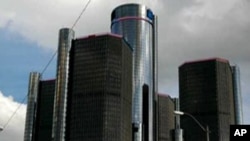Detroit, the heart of America's car industry, was once one of the richest cities in the United States. But car manufacturers have downsized their work force, and, in recent decades, more than half of Detroit's population has left. Today, the city is one of the nation's poorest.
Music, apparel and more
Division Street Boutique in Detroit sells locally made clothes inspired by the city.
Musician Tyler Baldwin started the shop a few years ago with two of his friends. He says Detroit is a good place to get a business idea off the ground.
“There’s a lot of opportunity to be the only one doing something. My music, I’m the only person that makes music like that. Our T-shirts are the only T-shirts that are the way they are. It’s just a completely original opportunity to be unique," he said. "And express yourself because there’s not a lot of people doing it.”
And, he says, the poverty of Detroit helps his creativity. “There’s just an aspect of complete desolation and isolation that makes you search within and become more intuitive and basically just get inspired to create something because there’s nothing here,” Baldwin noted.
Baldwin is not the only one using inspiration to stimulate Detroit's economy.
Entrepreneur training
Bizdom U trains and funds entrepreneurs to help them start their businesses.
CEO Ross Sanders says new businesses are changing the city's economy.
“It’s important for that shift to happen because, for a long time, the city of Detroit has relied on the auto companies. They have had kind of an employee mentality, and what we are really trying to do is create an entrepreneurial mentality. It’s great to be an employee, everybody needs to have good employees, but entrepreneurs don’t just fill a job, they create jobs,” he said.
John Mogk of Wayne State University says progress is taking place in downtown Detroit.
"There is no question that there is a new energy, there is new investment, there is expanded population. Step by step, there are significant improvements being made at the center of Detroit," he explained.
He says new shops and busy offices downtown signal a rejuvenated economic core.
Economic struggles still plague the city
But outside downtown Detroit, he says, the city tells another story.
Mogk says poverty and dilapidation are the norm across a 210-square-kilometer area.
Downtown Detroit, he says, is alone in turning a page. “The page that has not been turned is in the parts of the city with which Detroit’s problems are associated: dysfunctional families, poverty, low income, abandonment, poor schools, drug addiction," he said. "That doesn’t exist to any major degree in the core area, that exists in the other 130 square miles [210 square kilometers].”
But he says the growth of Detroit’s economic core may, in time, drive the wider economy forward with it.












